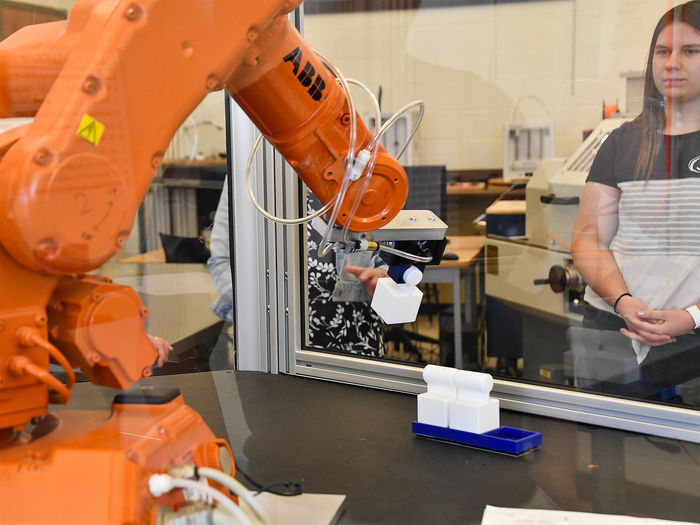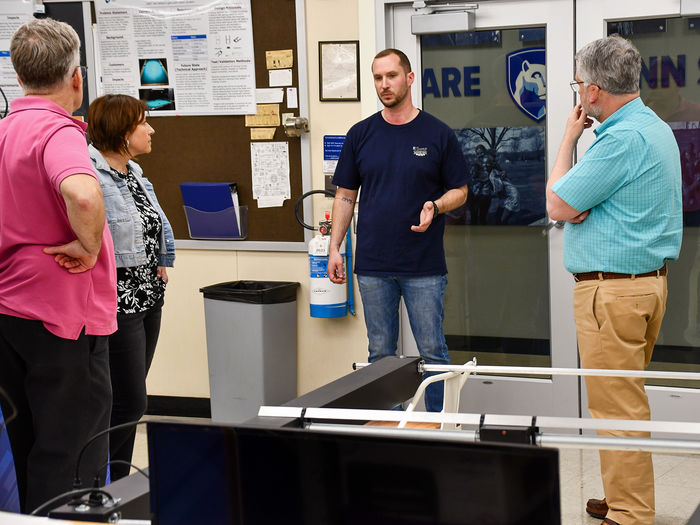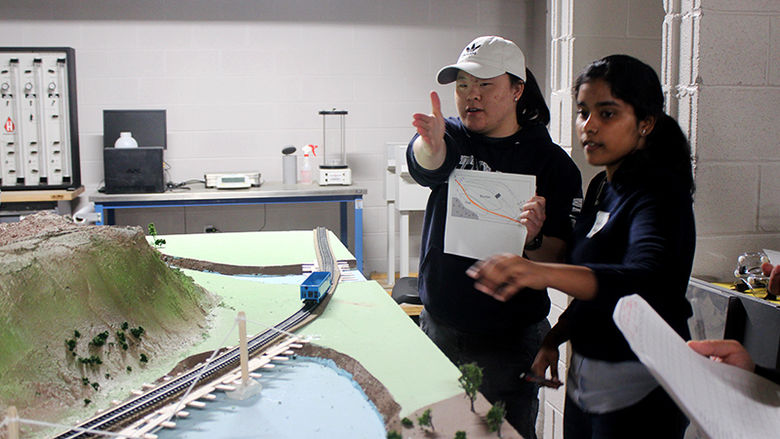The Electro-Mechanical Engineering Technology (EMET) program addresses a growing demand for engineers in the rapidly developing fields of industrial automation and robotics. EMET graduates combine the fundamental principles of both electrical and mechanical engineering to design, develop, manufacture, and test computer-controlled mechanical systems.
The combination of electrical and mechanical course work produces graduates proficient in both areas, making them highly marketable to employers. In fact, the demand for EMET graduates is strong because of the increased need for interdisciplinary skills to meet the complexity of modern industrial systems. Therefore, salaries for EMET graduates are comparable to those earned by traditional electrical engineering or mechanical engineering graduates.
Some EMET graduates fabricate and assemble equipment, design and produce prototype versions of new equipment, and work in research and development. Others work in quality control, inspecting products and processes, preparing and conducting tests and/or experiments, collecting and analyzing data, and calculating or recording results. In manufacturing environments, graduates work in product design, development, and production. EMET graduates have also successfully pursued degrees in a variety of graduate programs.
Program Overview
The bachelor of science degree in Electro-Mechanical Engineering Technology (EMET) provides graduates with the range of practical skills needed to be successful engineers in any industry where modern industrial and manufacturing control systems and robotics are heavily used. Students are exposed to a core of electrical and mechanical engineering topics, which are integrated with extensive studies in modern instrumentation and controls concepts.
Electrical topics include:
- basic circuits
- linear and digital electronics
- microcontrollers
- electrical power and machinery
Mechanical topics include:
- Computer Aided Design (CAD) and spatial analysis
- statics and dynamics
- properties and strength of engineering materials
- mechanical drives
- concepts in product and production design
Automation topics include:
- data acquisition
- instrumentation
- process control
Students are prepared to combine these engineering skills for use in industrial settings.
EMET graduates learn the skills necessary to apply current methods and technology to the development, design, operation, and management of electro-mechanical systems. They learn:
- instrumentation and monitoring methods
- principles of machine design
- automated control techniques
- thermal and fluid sciences
- computerized manufacturing systems
- electrical and electronic circuit operation
- computer-aided drafting and design
- economics of production
- statistical analysis and quality control
Design-based Curriculum
Design-based activities are incorporated throughout the EMET curriculum, with most courses paired with hands-on laboratory experiences. The program culminates in a capstone design project during the final two semesters that focuses on the planning, development, and implementation of an electro-mechanical design project. For the course, student teams manage a major project that must involve the design and implementation of a product or process that integrates electrical and mechanical components with elements of computer control.
Research Opportunities
Many of the EMET courses have a research component. Design-based activities are incorporated throughout the EMET curriculum, with most courses paired with hands-on laboratory experiences. The program culminates in a capstone design project during the final two semesters that focuses on the research, planning, development, and implementation of an electro-mechanical design project. For the course, student teams manage a major project that must involve the design and implementation of a product or process that integrates electrical and mechanical components with elements of computer control.
Internship Opportunities
Internships are not a requirement within the program, but there are typically many opportunities provided by local industry to interested students. Internships can be completed as noncredit or up to 6 credits which are applicable to the program.
Career Paths
EMET graduates combine the fundamental principles of both electrical and mechanical engineering to design, develop, manufacture, and test computer-controlled mechanical systems. The combination of electrical and mechanical course work produces graduates proficient in both areas, making them highly marketable to employers. In fact, the demand for EMET graduates is strong because of the increased need for interdisciplinary skills to meet the complexity of modern industrial systems. Therefore, salaries for EMET graduates are comparable to those earned by traditional electrical engineering or mechanical engineering graduates.
Graduates of this program enjoy a wide variety of opportunities in industry. Some EMET graduates fabricate and assemble equipment, design and produce prototype versions of new equipment, and work in research and development. Others work in:
- quality control
- inspecting products and processes
- preparing and conducting tests and/or experiments
- collecting and analyzing data
- calculating or recording results
In manufacturing environments, graduates work in product design, development, and production. EMET graduates have also successfully pursued degrees in a variety of graduate programs.
Since the EMET program is ABET ETAC-accredited, EMET graduates are candidates to sit for the Fundamental of Engineering (FE) Exam, the first step in the engineering licensure process. Accreditation requirements vary from state to state, and they should be verified in pursuit of professional licensure.
Many US states and territories require professional licensure/certification to be employed. If you plan to pursue employment in a licensed profession after completing this program, please visit the Professional Licensure/Certification Disclosures by State interactive map.








